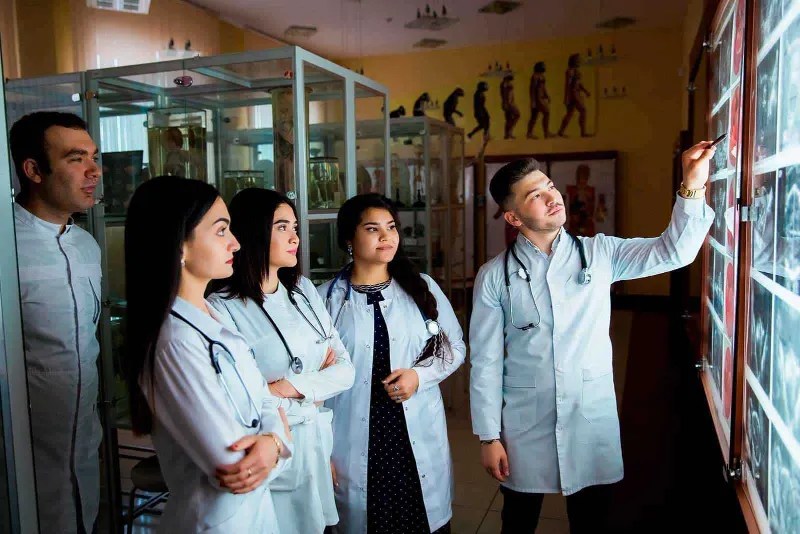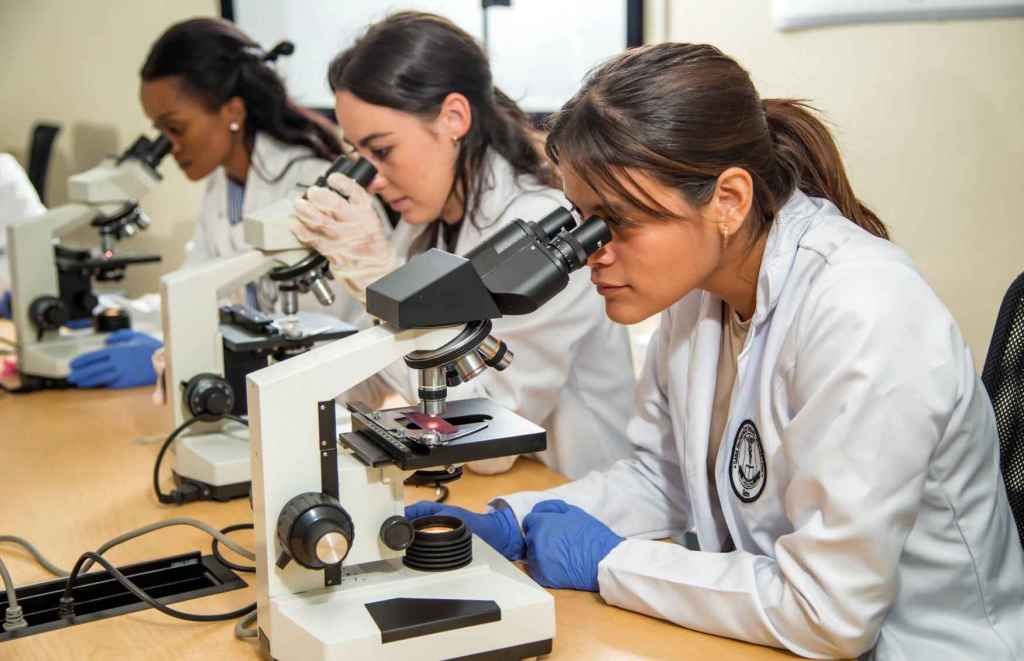
What Is the Difference between Basic Sciences and Clinical Medicine?
Learn more about the unique differences between the Basic Sciences and Clinical Medicine semesters.
Last Updated: October 1, 2024
Basic Sciences and Clinical Medicine are terms that can be erroneously interchanged, given that they are both parts of most Doctor of Medicine (MD) programs. However, there are distinct differences between the two.
If you’re an aspiring medical student, you should understand the difference between Basic Sciences (academic/classroom instruction) vs. Clinical Medicine (hands-on learning in hospitals/clinics). Read ahead to learn how to differentiate between these two medical program branches.
What is Basic Sciences?
Basic Sciences involves the study of the basic structure and functions of the human body. You will learn about different aspects of human anatomy, along with the types and natures of diseases affecting health outcomes. Basic Sciences usually precedes Clinical Medicine and provides the theoretical support for developing the essential hands-on clinical skills required of a practicing doctor.
In essence, the question of Basic Sciences vs Clinical Medicine could also correctly be framed as academic medicine vs clinical medicine. The first focuses on classroom based learning, while the second focuses on hands-on learning with real patients. However, the second is dependent on the first. You must learn everything you can in class before you can effectively treat real patients.
A strong foundation of knowledge in general biology and chemistry will provide a good starting point for those planning to enroll in an MD program that begins with a Basic Sciences program.
Basic Sciences at SUSOM
At Saba University School of Medicine (SUSOM), the Basic Sciences curriculum lasts for the first five semesters of the 4-Year MD Program. It covers human metabolism, systems and disease, nutrition, human body structure and much more.
Important to note that the SUSOM Basic Sciences program does feature hands-on components in labs and classroom demonstrations. This ensures that students are well-prepared for clinical rotations when they begin providing care for real patients.
Here are the basics of medicine subjects that you will study if you choose to enroll at Saba University School of Medicine.
- Human Body Structure and Function
- Human Histology and Physiology
- Clinical Skills I
- Metabolism and Nutrition
- Genetics and Development
- Infection/Defense/Response
- Medical Ethics
- Clinical Skills II
- Research Curriculum – Evidence-Based Medicine
- Neuroscience and Neurology
- Systems and Disease I
- Clinical Skills III
- Behavioral Medicine
- Systems and Disease II
- Systems and Disease III
- Clinical Skills IV
- Systems and Disease IV
- Clinical Skills V
- Foundations of Clinical Medicine
- Research Curriculum – Critical Appraisal
Once you master the basic medical subjects at SUSOM, you will be eligible to apply to take Step 1 of the United States Medical Licensing Examination (USMLE).
The USMLE Step 1 exam is considered one of the most demanding professional licensing exams in the medical profession. In order to ensure that our students are well-prepared, the Foundations of Clinical Medicine course in our 5th semester provides a comprehensive review of Basic Sciences concepts and materials, detailed preparation and a full-length simulated exam experience.
If you’re wondering whether you’ll succeed on the USMLE exams, SUSOM can help. Thanks to our expansive education, dedicated faculty and individualized support, our students consistently achieve strong results on the USMLE Step 1 – in fact, they are very comparable to top medical programs in the United States.
We are very proud to share that over the last three years, 2021-2023, our students achieved a 99% first-time pass rate on both the USMLE Step 1* and USMLE Step 2 CK** exams!
Learn more about the MD program at SUSOM.


What is Clinical Medicine?
You are now likely asking, “what does Clinical Medicine mean?” So let’s discuss…
After the Basic Sciences portion of the 4-year MD Program comes the five semesters of Clinical Medicine, where SUSOM students undertake clinical rotations at teaching hospitals and learning centers in the U.S. and Canada.
Clinical Medicine involves taking your academic/classroom based knowledge and skills, and beginning to apply them in real-world settings with patients in need of care. That’s the essential Clinical Medicine meaning.
Students work directly with physicians and hospital staff to conduct physical examinations, take histories, present cases, analyze lab results and also attend workshops, conferences and grand rounds. Given that you will be new to hands-on care, you will be closely supervised in the beginning, with more autonomy being earned as you develop your abilities.
Students are expected to continue learning in their personal time, and onsite experiences are supplemented by additional case studies and associated assignments. The SUSOM team also continues to support our students throughout the Clinical Medicine portion, just like we do during Basic Sciences.
Clinical Medicine at SUSOM
At Saba University School of Medicine, the Clinical Medicine program involves the following components:
- An 8-week research module
- 42 weeks of compulsory clinical rotations in core subjects like surgery, internal medicine, pediatrics, obstetrics and gynecology, and psychiatry
- 30 weeks of elective clinical rotations based upon the desired medical specialty of the student
At the end of the Clinical Medicine program, you will be eligible to sit for the USMLE Step 2 CK exam. This Clinical Knowledge based exam tests students for their clinical understanding of medical theory, applied using real clinical examples. This exam uses standardized patients to highlight diagnostic challenges and patient-centric behavior, while also assessing the student’s documentation abilities.
The core and elective clinical rotations, as a part of the Clinical Medicine program at SUSOM, can expose you to different case studies and feedback, enhancing your abilities and preparation for a career in medicine. It can also help you explore diverse career options within medicine, and direct you towards the specialty you pursue in residency after graduation.
To learn more about the medical school journey, check out this video featuring SUSOM alum Dhanjit Litt, MD:
Just one more item to discuss before we wrap up…
What are the key differences between clinical vs. medical?
Finally, let’s define two terms that often get confused when discussing the field of medicine. The difference between “clinical” and “medical” lies in their scope and involvement with patient care:
- Clinical: This term specifically refers to activities that involve direct patient care. It includes diagnosing, treating and managing patients’ health in settings like hospitals, clinics and other healthcare facilities.
- Medical: A broader term that encompasses both areas of direct patient care (clinical) and those that do not involve direct patient care. Medical includes research, administrative roles and other healthcare-related fields that support patient care but do not directly engage with patients.
This distinction will help inform and enhance your understanding of medicine as you consider a career as a practicing doctor.
Conclusion
At Saba University School of Medicine, we’ve proudly helped 3,000+ graduates develop successful careers as practicing physicians in the U.S., Canada and around the world. We do this thanks to the detailed on-campus and clinical education that enriches the knowledge, understanding and skills of our MD program participants.
Basic Sciences and Clinical Medicine go hand-in-hand, and both are essential components of a medical education that helps students go on to become future doctors and healthcare leaders. If this aligns with your own career goals, we’d love to help you get there!
Contact us today to learn how SUSOM can help you succeed.
*Based on 2021-2023 data. First-time pass rate defined as total number of students passing the USMLE Step 1 on their first attempt divided by the total number of students taking USMLE Step 1 for the first time during the calendar years 2021 to 2023.
**Based on 2021-2023 data. First-time pass rate defined as total number of students passing the USMLE Step 2 CK on their first attempt divided by the total number of students taking USMLE Step 2 CK for the first time between the calendar years 2021 to 2023.
Frequently Asked Questions
Clinical Medicine involves hands-on training with real patients in need of care. At SUSOM, MD program students undertake Clinical Medicine rotations at U.S. and Canadian teaching hospitals and clinics. This occurs over semesters 6-10 of the ten semester MD program. It follows Basic Sciences and precedes graduation/residency.
SUSOM offers its MD program students a variety of clinical rotation opportunities across different medical specialties, including internal medicine, surgery, pediatrics, obstetrics and gynecology, and psychiatry. These rotations take place in affiliated U.S. and Canadian teaching hospitals and healthcare facilities, providing students with diverse and comprehensive hands-on clinical experiences, which are essential for their medical training. Learn more about core and elective rotations: www.saba.edu/academics/programs/med-program/clinical-medicine.
Basic Sciences usually encompasses the first half of medical school and includes classroom/lab based learning. Clinical Medicine then follows over the second half of medical school and features hands-on training with real patients at teaching hospitals and clinics. Both are essential components of an MD program education and work together to develop students into successful practicing doctors and healthcare leaders.
In medical fields, clinical medicine essentially means providing healthcare services directly to real patients in health facilities. Medical jobs that would not fall under clinical medicine would be research and administrative roles, for example.

For prospective students
Saba is committed to supporting prospective students with any questions or queries throughout the application process. Please see the following links for detailed information about each topic:
If the information you are seeking is not provided here, please get in contact by contacting via WhatsApp here.
Get in touch for more information